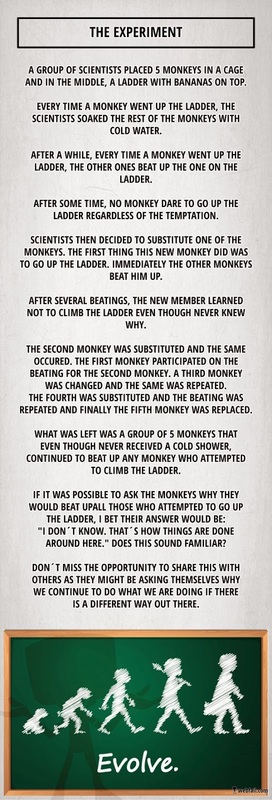First, there were people who took this at face value, and thought it was a real experiment. It's close enough to articles we've all read about animal research, or classes we took on psychology or science that we can picture the experiment actually happening. The experiment seems cruel, and unnecessary. People who dislike animal research are quick to condemn "the experiment" as cruel, instilling fear, and brutish. And really, it is a cruel experiment, in my opinion. But much of the animal research done in science and psychology has been cruel. What have we (man, scientists, or society) learned from these cruel experiments?
Here is one example of what seems to be a similar experiment, actually in the literature:
"Stephenson (1967) trained adult male and female rhesus monkeys to avoid manipulating an object and then placed individual naïve animals in a cage with a trained individual of the same age and sex and the object in question. In one case, a trained male actually pulled his naïve partner away from the previously punished manipulandum during their period of interaction, whereas the other two trained males exhibited what were described as "threat facial expressions while in a fear posture" when a naïve animal approached the manipulandum. When placed alone in the cage with the novel object, naïve males that had been paired with trained males showed greatly reduced manipulation of the training object in comparison with controls. Unfortunately, training and testing were not carried out using a discrimination procedure so the nature of the transmitted information cannot be determined, but the data are of considerable interest."
Sources:
Stephenson, G. R. (1967). Cultural acquisition of a specific learned response among rhesus monkeys. In: Starek, D., Schneider, R., and Kuhn, H. J. (eds.), Progress in Primatology, Stuttgart: Fischer, pp. 279-288.
And do scientists continue doing cruel experiments, or do they learn from these experiments, and move on to something even more involved? One of the tenets of good science is that we build upon the research of others. Another tenet is repetition of experiments. How many times do you have to repeat this experiment to retain valid results? One criticism I often receive in biology class is during animal dissections. Students who don't like dissections say, "I'm not learning anything from this! It's cruel! All these fetal pigs (or rats, or frogs) died for nothing! (in the case of Anatomy and Physiology, the cats we dissected are collected from the animal shelters after they are put to sleep, and then preserved, so is it better that we use those animals to learn? That they did not die in vain?) Why can't we just watch a video?" I think it's an important curriculum decision in Biology. Do we keep dissecting frogs, just because that's what has always been done? (Hmmmm, another "experiment")
Did you see an allusion to the way religion has woven it's way through societies? People have been punished for certain religious beliefs, or for the lack of religious beliefs. One commenter said "Oh man, this reminds me of my work place!" Do you ever feel like you are surrounded by monkeys? Maybe you see superstition being "taught" through the experiment. An irrational fear that has no apparent purpose. Aspects of culture, civilization, religion, and evolution are unearthed, by a deeper inspection of "The Experiment."
Maybe you see "Monkey see, monkey do?" Maybe this post is meant to spur one to action, to think "out of the box," to question tradition, or to be brave. Should we resist the the urge to conform? Always, or just sometimes? Is there every happiness in conformity, or should you always buck the norms, throw tradition to the wind, and do your own thing, regardless of "being hosed?"
This morning, my son asked if he could take two toys to school. I asked him, "Does your teacher let you bring toys to school?" He said, "Well, only on Fridays. (it was Tuesday) And we aren't allowed to bring balls. Mr. Flinn says that bouncing balls in class breaks things." If you are the parent, what do you tell your child? Follow the rules? Break the rules? Why are there rules? Why do we listen (or not listen) to the teacher, or parents, or society's rules? If my son took a ball to class today, what might have happened? Maybe nothing. Maybe nothing would break, and my son would think the rules are stupid. Maybe he would bounce that ball, and something in class WOULD break, and then what? What did my child learn about rules then? How do we decide what rules count, and what rules should be challenged? What's good for one man, is not necessarily what's good for mankind. And what's good for one monkey, may make for monkey business in the larger monkey culture. Who decides?



 RSS Feed
RSS Feed
